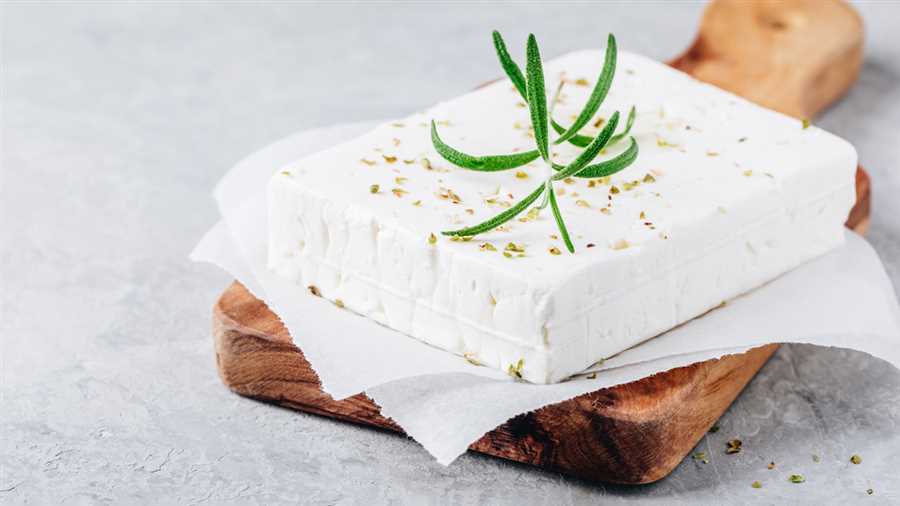


Pregnancy is a time when women need to pay extra attention to their diet and avoid certain foods that may pose a risk to their health and the health of their baby. Feta cheese is a popular choice for many, but can it be safely consumed during pregnancy?
The answer is yes, you can eat cooked feta cheese while pregnant. Feta cheese is made from pasteurized milk, which means it has been heated to kill any bacteria or harmful pathogens. If the feta cheese is properly cooked, it should be safe to eat during pregnancy.
However, it is important to note that feta cheese made from raw or unpasteurized milk should be avoided during pregnancy. Raw milk and cheese can contain harmful bacteria such as Listeria, which can cause serious illnesses like listeriosis. Pregnant women are at a higher risk of developing listeriosis, which can lead to miscarriage, stillbirth, or other complications.
Pregnancy and food safety
During pregnancy, it is important to pay attention to food safety to ensure the health and well-being of both the mother and the unborn baby. Some foods may pose a risk of foodborne illnesses that can be harmful to the pregnancy.
Raw and undercooked foods: It is recommended to avoid consuming raw or undercooked foods, such as raw seafood, raw or undercooked eggs, and raw or undercooked meats. These foods may contain bacteria, viruses, or parasites that can cause foodborne illnesses, such as salmonella or listeria.
Soft cheeses: Soft cheeses like feta, blue cheese, and camembert may contain bacteria called listeria, which can cross the placenta and cause infections in the baby. It is advisable to avoid consuming these cheeses during pregnancy, unless they are cooked or made from pasteurized milk.
Processed meats: Processed meats, such as deli meats and hot dogs, may also pose a risk of listeria contamination. It is recommended to heat these meats thoroughly before consuming to reduce the risk of infection.
Fish high in mercury: Some fish, such as shark, swordfish, king mackerel, and tilefish, are known to contain high levels of mercury. Mercury can be harmful to the baby’s developing nervous system. It is advisable to limit the consumption of these fish during pregnancy and opt for low-mercury alternatives like salmon, trout, and sardines.
Caffeine and alcohol: It is important to limit the intake of caffeine and avoid alcohol during pregnancy. High caffeine intake has been linked to an increased risk of miscarriage, while alcohol consumption can cause a range of birth defects and developmental issues.
Fruits and vegetables: Eating a variety of fruits and vegetables is essential during pregnancy to ensure a well-balanced diet. However, it is important to wash them thoroughly to remove any potential contaminants, such as pesticides or bacteria.
It is always best to consult with a healthcare provider or a registered dietitian for personalized advice on pregnancy nutrition and food safety.
Feta cheese and pregnancy

Can I eat cooked feta cheese while pregnant?
Expectant mothers often have questions about what foods are safe to eat during pregnancy. Feta cheese, a popular type of cheese, is a concern for many pregnant women due to its potential risk of listeria contamination. Listeria is a harmful bacteria that can cause food poisoning and can be particularly dangerous during pregnancy.
What is feta cheese?
Feta cheese is a soft, crumbly cheese that is traditionally made from sheep’s milk or a mixture of sheep’s and goat’s milk. It has a tangy and salty taste, making it a popular ingredient in salads, sandwiches, and various Mediterranean dishes.
Is feta cheese safe to consume during pregnancy?
According to experts, pregnant women are advised to avoid consuming feta cheese if it is made from unpasteurized milk. Unpasteurized dairy products can potentially contain harmful bacteria, including listeria. Therefore, pregnant women should ensure that the feta cheese they consume is made from pasteurized milk.
Can I eat cooked feta cheese?
Yes, pregnant women can safely consume cooked feta cheese. Cooking kills off any potential harmful bacteria, including listeria, making the cheese safe to eat. It is important to ensure that the feta cheese is cooked thoroughly, reaching a safe internal temperature.
Precautions to take
When consuming feta cheese during pregnancy, it is important to follow these safety measures:
- Check the label: Ensure that the feta cheese is made from pasteurized milk.
- Cook thoroughly: If you choose to consume feta cheese, make sure it is cooked to a safe internal temperature of 165°F.
- Storage: Store feta cheese in the refrigerator and consume it before the expiration date.
- Wash hands and utensils: Before handling feta cheese, wash your hands and clean any utensils used to prevent cross-contamination.
Please consult with your healthcare provider or a medical professional for personalized advice regarding your pregnancy and dietary concerns.
Precautions with feta cheese
While feta cheese can be a delicious addition to meals, it is important to take certain precautions if you are pregnant. Here are some things to keep in mind:
1. Pasteurized feta cheese
When selecting feta cheese, ensure that it is made from pasteurized milk. Unpasteurized or raw milk products have a higher risk of containing harmful bacteria such as Listeria, which can cause foodborne illnesses.
2. Check the label
Always read the label carefully to make sure the feta cheese you are buying is made from pasteurized milk. It is essential to avoid any cheese that does not specify that it is pasteurized.
3. Proper storage

After opening a package of feta cheese, make sure to store it properly. Keep it refrigerated at a temperature below 40°F (4°C) and consume it within the recommended time frame. This will help reduce the risk of bacteria growth.
4. Cooking feta cheese
If you are unsure about the safety of consuming feta cheese during pregnancy, it is best to err on the side of caution and cook the cheese. Heating feta cheese to a safe temperature can help kill any potential bacteria that may be present.
Remember, it is always a good idea to consult with your healthcare provider before making any dietary changes or consuming certain foods during pregnancy.
Health benefits of feta cheese
Feta cheese is not only delicious but also offers several health benefits. Here are some of the reasons why feta cheese can be a good addition to your diet:
- Rich in nutrients: Feta cheese is packed with essential nutrients like calcium, protein, phosphorus, and vitamins A and B12. These nutrients are important for maintaining overall health and well-being.
- Good for bones: Feta cheese is a good source of calcium, which is crucial for strong and healthy bones. Including feta cheese in your diet can help in preventing conditions like osteoporosis.
- Probiotics: Feta cheese is made from sheep’s or goat’s milk, and it undergoes a fermentation process. This makes it a good source of probiotics, which can promote a healthy gut and improve digestion.
- Reduced risk of heart disease: Feta cheese is low in fat and cholesterol, making it a heart-healthy choice. It contains linoleic acid, which can help lower the risk of heart disease and improve overall cardiovascular health.
- Rich in antioxidants: Feta cheese contains antioxidants like vitamin E, which can protect the body against free radicals and reduce the risk of chronic diseases.
While feta cheese offers many health benefits, it is important to consume it in moderation, especially during pregnancy. If you are pregnant, make sure to consult your doctor or healthcare provider before making any changes to your diet.
Alternatives to feta cheese
If you are pregnant and cannot eat feta cheese, there are several alternatives that you can include in your diet. These alternatives offer similar taste and texture as feta cheese, while still providing the necessary nutrients for you and your baby.
1. Goat cheese
Goat cheese is a popular substitute for feta cheese. It has a tangy and creamy flavor that is similar to feta, making it a great option for salads, sandwiches, and even pasta dishes.
2. Ricotta cheese
Ricotta cheese is another alternative to feta cheese. It is a soft cheese with a mild flavor, making it versatile and suitable for various recipes. You can use ricotta cheese as a replacement in salads, spreads, and even in baking.
Remember to always check the labels and make sure that the cheese you choose is made with pasteurized milk. Avoid any unpasteurized or soft cheeses that may pose a risk of listeria contamination during pregnancy.
As always, it is best to consult with your doctor or healthcare provider for specific dietary recommendations during pregnancy.
Question-answer
Is it safe to eat cooked feta cheese during pregnancy?
Yes, it is safe to eat cooked feta cheese during pregnancy. Cooking the feta cheese thoroughly kills any harmful bacteria that may be present in the cheese.
Can I eat pasteurized feta cheese while pregnant?
Yes, you can safely consume pasteurized feta cheese during pregnancy. Pasteurization kills harmful bacteria, making it safe for pregnant women to eat.
What are the risks of eating raw feta cheese while pregnant?
Eating raw feta cheese during pregnancy can pose a risk of foodborne illnesses such as listeriosis. Listeriosis can lead to serious complications and harm the baby. It is important to ensure that the feta cheese is properly cooked before consumption.
Can I eat feta cheese as part of a cooked dish while pregnant?
Yes, you can include feta cheese as part of a cooked dish during pregnancy. When the feta cheese is cooked at a high temperature, it kills any potential bacteria that could be harmful. Just make sure the dish is thoroughly cooked before eating.






